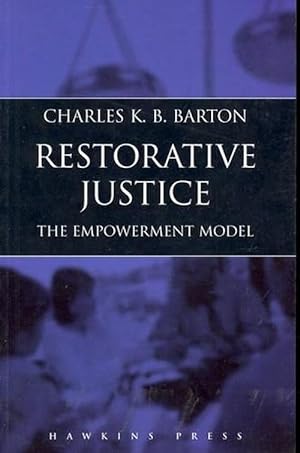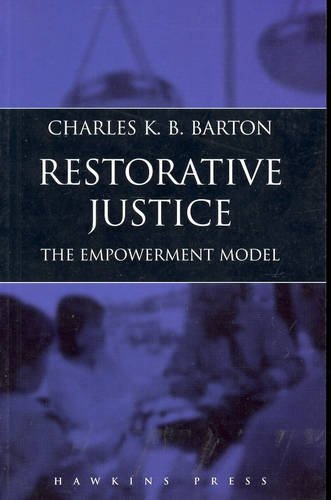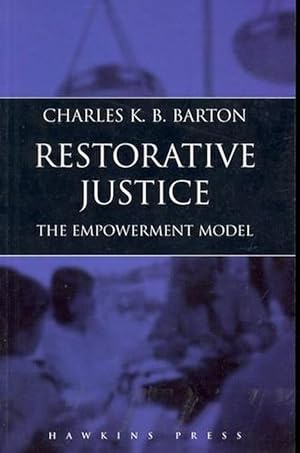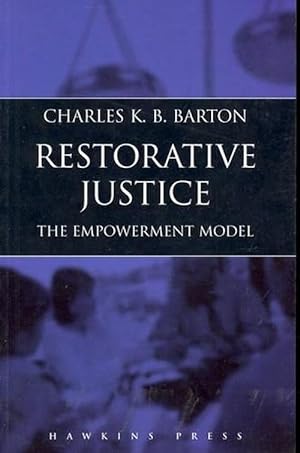9781876067168 - Restorative Justice di Barton, Charles (4 risultati)
Tipo di articolo
- Tutti gli articoli
- Libri (4)
- Riviste e Giornali
- Fumetti
- Spartiti
- Arte, Stampe e Poster
- Fotografie
- Mappe
-
Manoscritti e
Collezionismo cartaceo
Condizioni
Legatura
- Tutte
- Rilegato
- Brossura
Ulteriori caratteristiche
- Prima edizione
- Copia autografata
- Sovraccoperta
- Con foto (3)
- No print on demand
Paese del venditore
Valutazione venditore
-
Restorative Justice (Paperback)
Editore: Federation Press, Annandale, NSW, 2003
ISBN 10: 1876067160ISBN 13: 9781876067168
Da: Grand Eagle Retail, Wilmington, DE, U.S.A.
Libro
Paperback. Condizione: new. Paperback. Restorative Justice - The Empowerment Model presents a powerful challenge to many current accounts of the criminal justice system. \nCharles Barton gives a clear and insightful analysis of current restorative justice philosophy and theory. He uses a unifying and overarching principle of empowerment to provide a distinct conceptual framework for restorative justice theory and practice. \nHe puts forward a step-by-step implementation process, which includes restorative meeting facilitation, complete with seating plans and scripted prompts for mediators, keepers, and facilitators. There will also be two sample role plays in the book and additionally there will be four complete role plays available on our website, closer to publication. \nBarton emphasises the importance of each participant in a restorative justice meeting - the victims, offenders and their supporters as well as professionals such as police, social workers and legal advocates. Successful programs must consistently and reliably achieve maximally restorative outcomes for all of them. \nPractitioners need always keep this objective in mind. Barton's book will strengthen their comprehension and facilitate application of the practical process. \n Presents a challenge to accounts of the criminal justice system. This book gives an analysis of restorative justice philosophy and theory. It provides a conceptual framework for restorative justice theory and practice. Shipping may be from multiple locations in the US or from the UK, depending on stock availability.
-
Restorative Justice: The Empowerment Model
Editore: Hawkins Press, 2003
ISBN 10: 1876067160ISBN 13: 9781876067168
Da: Anybook.com, Lincoln, Regno Unito
Libro
Condizione: Fair. This is an ex-library book and may have the usual library/used-book markings inside.This book has soft covers. Clean from markings. In fair condition, suitable as a study copy. Please note the Image in this listing is a stock photo and may not match the covers of the actual item,450grams, ISBN:9781876067168.
-
Restorative Justice (Paperback)
Editore: Federation Press, Annandale, NSW, 2003
ISBN 10: 1876067160ISBN 13: 9781876067168
Da: AussieBookSeller, Truganina, VIC, Australia
Libro
Paperback. Condizione: new. Paperback. Restorative Justice - The Empowerment Model presents a powerful challenge to many current accounts of the criminal justice system. \nCharles Barton gives a clear and insightful analysis of current restorative justice philosophy and theory. He uses a unifying and overarching principle of empowerment to provide a distinct conceptual framework for restorative justice theory and practice. \nHe puts forward a step-by-step implementation process, which includes restorative meeting facilitation, complete with seating plans and scripted prompts for mediators, keepers, and facilitators. There will also be two sample role plays in the book and additionally there will be four complete role plays available on our website, closer to publication. \nBarton emphasises the importance of each participant in a restorative justice meeting - the victims, offenders and their supporters as well as professionals such as police, social workers and legal advocates. Successful programs must consistently and reliably achieve maximally restorative outcomes for all of them. \nPractitioners need always keep this objective in mind. Barton's book will strengthen their comprehension and facilitate application of the practical process. \n Presents a challenge to accounts of the criminal justice system. This book gives an analysis of restorative justice philosophy and theory. It provides a conceptual framework for restorative justice theory and practice. Shipping may be from our Sydney, NSW warehouse or from our UK or US warehouse, depending on stock availability.
-
Restorative Justice (Paperback)
Editore: Federation Press, Annandale, NSW, 2003
ISBN 10: 1876067160ISBN 13: 9781876067168
Da: CitiRetail, Stevenage, Regno Unito
Libro
Paperback. Condizione: new. Paperback. Restorative Justice - The Empowerment Model presents a powerful challenge to many current accounts of the criminal justice system. \nCharles Barton gives a clear and insightful analysis of current restorative justice philosophy and theory. He uses a unifying and overarching principle of empowerment to provide a distinct conceptual framework for restorative justice theory and practice. \nHe puts forward a step-by-step implementation process, which includes restorative meeting facilitation, complete with seating plans and scripted prompts for mediators, keepers, and facilitators. There will also be two sample role plays in the book and additionally there will be four complete role plays available on our website, closer to publication. \nBarton emphasises the importance of each participant in a restorative justice meeting - the victims, offenders and their supporters as well as professionals such as police, social workers and legal advocates. Successful programs must consistently and reliably achieve maximally restorative outcomes for all of them. \nPractitioners need always keep this objective in mind. Barton's book will strengthen their comprehension and facilitate application of the practical process. \n Presents a challenge to accounts of the criminal justice system. This book gives an analysis of restorative justice philosophy and theory. It provides a conceptual framework for restorative justice theory and practice. Shipping may be from our UK warehouse or from our Australian or US warehouses, depending on stock availability.





